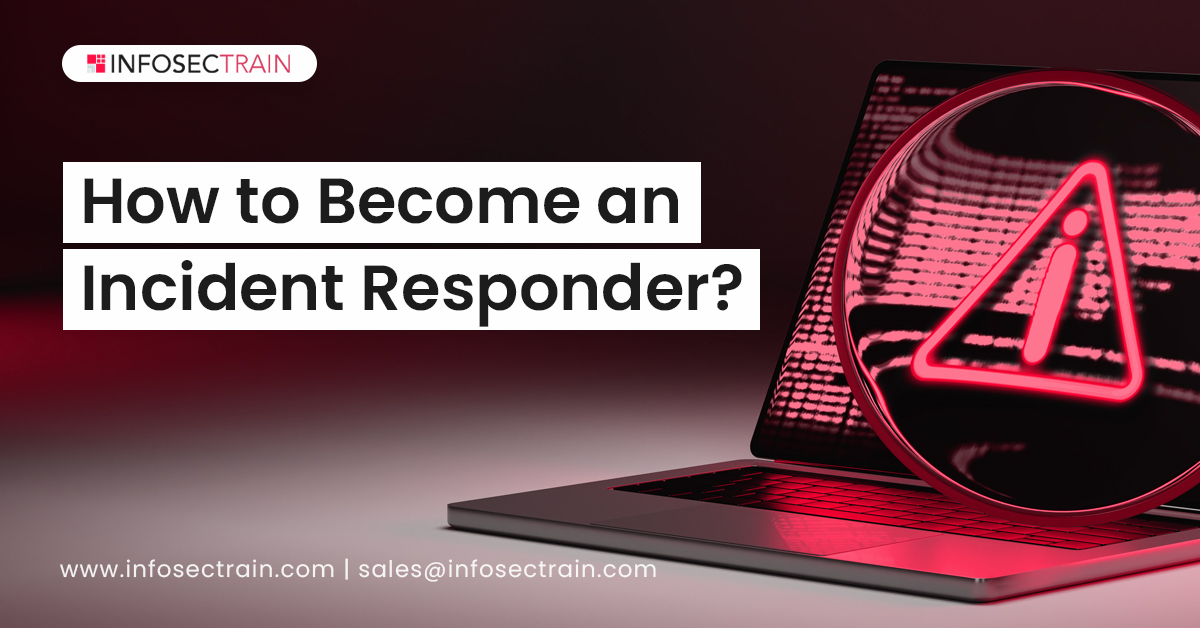How to Become an Incident Responder?
Overview
Cyber Incident Responder, Computer Network Defense Incident Responder, and Incident Response Engineer are just a few of the positions available in the incident response sector. Intrusion Detection Specialists, Forensics Intrusion Analysts, and Network Intrusion Analysts are all similar jobs. Incident Responders aim to defend and improve corporate security by identifying, averting, and reducing security risks.

System monitoring, evaluation, testing, and analysis are all part of the prevention tasks aimed at detecting and correcting possible security breaches. Security plans, guidelines, protocols, and training are frequently developed by incident responders to ensure that companies are prepared to respond to incidents quickly and effectively. Such experts usually work under stress to effectively analyze and respond to attacks via intrusion detection, security audits, and risk analysis. Network forensics, reverse engineering, and penetration testing abilities can all be helpful in preventing security threats. Incident Responders are also responsible for preparing documents for management and law enforcement.
Incident responders are hired by organizations to secure their revenue and brand reputation against cybercrime damages. In big corporations, incident responders work with CSIRTs (Computer Security Incident Response Teams). Several Incident Responder roles need previous expertise in information security or forensics of at least two years.
How to Become an Incident Responder?
In an emergency, immediate responders are crucial to safety. Incident responders are essential persons in the area of cybersecurity that come to the rescue when security systems go down. They work quickly to resolve difficulties inside an organization and take the required steps to avoid additional issues.
Companies will look for an applicant who has spent several years as part of a security team in a company that is similar to theirs. The entrance point consists of knowledge and expertise with security concepts, as well as strategic planning, techniques, and procedures.
The following are the requirements for an incident responder position:
1. Education: You will not need a bachelor’s degree to work in this particular sector of cybersecurity incident responder but I will suggest earning a bachelor’s degree in computer science, a bachelor’s degree in cybersecurity, or a bachelor’s degree in information technology. A master’s degree in one of these fields can expand your career options much more.
2. Career: The basic career path of the incident responder is working as an Information Security Specialist, Security Administrator, Network Administrator, and System Administrator for 2-3 years. Other job experience, like Forensic Examiner or even offensive security experience, may be needed depending on the unique demands of a company and the sector in which they work.
3. Certifications: An incident responder can earn a variety of certifications in the field of information security. The following list contains the most widely accepted certificates, which we believe will be quite beneficial to you as you go through your Incident Response job duties.
- EC-Council’s Certified Incident Handler v2 (E|CIH)
- Certified Ethical Hacker (CEH)
- CompTIA PenTest+
- GIAC Certified Forensic Examiner (GCFE)
- GIAC Certified Forensic Analyst (GCFA)
- GIAC Certified Incident Handler (GCIH)
4. Experience: Generally, the required experience for an entry-level role is 2-3 years in the security team. It’s a benefit if you’ve worked with forensic software before. A basic requirement is work experience showing the ability to write technical reports that are clear and easy to understand.
Incident Responder Skills
Today, organizations want you to comprehend and learn their systems from the roots up, as well as be able to detect any possible security issues. They’ll also be on the lookout for advanced forensics abilities, particularly in big organizations like Google. The following list aims to provide you with an idea of the most important technical abilities you should possess before applying for this job.
- Excellent knowledge of computer operating systems such as Linux, UNIX, and Windows
- Knowledge of forensics software such as EnCase, Helix, XRY, and FTK
- Programming languages C, C++, C#, Java, ASM, PHP, PERL
- Cloud computing
- You should be familiar with eDiscovery technologies like NUIX, Relativity, and Clearwell, among others
- Knowledge of TCP/IP Protocols
- Enterprise system monitoring tools and SIEMs
Salary
According to Glassdoor and Indeed, the average yearly income of an incident responder is $74,000 and $70,000, respectively. This figure varies by location, required responsibilities, education, professional qualifications, and industry. Lastly, it should be unsurprising that a CSIRT Manager or Leader earns more than any of the above-given salary figures. On average, he could expect to earn between $100,000 and $150,000.
Instructor-led Training
InfosecTrain is a leading provider of IT security training and consulting organization, focusing on a wide range of verticals in IT security certification, cloud computing, programming, etc. The training sessions will be delivered by highly qualified and professional trainers with years of industry experience whom you can easily interact with and solve your doubts anytime. If you are interested and want a bright career in Incident handling and response, then InfosecTrain provides the best online ECIH certification training. You can check and enroll in our EC-Council Certified Incident handler (ECIH) training program.







 1800-843-7890 (India)
1800-843-7890 (India)